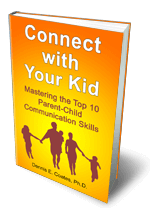A teenager made a dumb mistake and damaged a tool.
His father, angry, shouted at him about carelessness and irresponsibility.
No love, understanding or respect was communicated in the heated interchange.
The boy felt like a failure and resented his father for putting him down.
Unfortunately, this wasn’t an isolated incident.
It was a pattern. It was how the father felt he needed to deal with his son.
Feeling like a loser, the boy made friends with other boys with low self-esteem.
Eventually, they did things together that got them in trouble with the law.
The parents’ raised voices got even louder this time.
The boy sensed a great distance between him and his parents.
He shut them out, rebelled and went his own way.
He ignored his parents’ threats and warnings and thought about dropping out of school and leaving home.
Instead, he “medicated” with alcohol and drugs until he graduated.
He joined the Army fresh out of high school and was soon deployed to the Middle East.
There he was severely injured by a roadside I.E.D. He survived but lost his right arm. He was discharged with a disability.
For years, he was depressed and found it hard to hold down a decent job.
His parents tried to help him, but it took years for the young man to heal his psychic wounds and repair his relationship with his parents.
Does this story seem improbable to you? I hope not. It’s an accurate summary of what happened to a friend of mine. It was hard for me to watch this drama play out.
Sadly, this scenario of parents unwittingly alienating their adolescent children, damaging the relationship in the process, is all too common. In fact, it’s classic. Like the ideal marriage, the ideal parent-child relationship – what parents hope for – is not the rule, but the exception.
Could things have turned out differently for the family in the story?
Maybe, but it would have required the parents to use communication skills they didn’t have.
This saddens me because it’s rare for parents to have the best communication skills.
Which means that parents, not teens, are responsible for this kind of vicious cycle and the erosion of the parent-teen bond.
But ironically, it isn’t their fault.
Learning effective communication skills was never a part of their education. Not in high school and not in college.
I believe that by far most parents are doing the best they know how, even though they’re making it hard for their kids to become happy, strong, successful adults.
From the perspective of the high stakes of failed relationships, this shortcoming in education may sound crazy, but it’s the norm. Kids pick up ways of dealing with each other in an unconscious, random way.
What teens want most are love, understanding, and respect. And the way parents talk to them all too often fails to communicate this.
Think “generation gap” – why young people, so naïve and with so much to learn, think their parents and other adults are clueless.
More truth-telling about parent-teen communication.
 The ultimate book about “how to talk to your kid”: Connect with Your Kid: Mastering the Top 10 Parent-Child Communication Skills.
The ultimate book about “how to talk to your kid”: Connect with Your Kid: Mastering the Top 10 Parent-Child Communication Skills.
You can grow the bond with your child through better listening. Download the FREE ebook, Listening to Understand.

